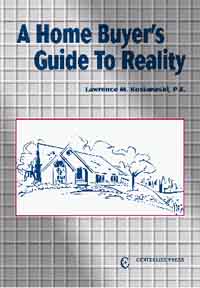
IT RUNS DOWNHILL
edited excerpts from
"A Home Buyer's Guide To Reality"
by Lawrence M. Kostaneski, PE
Copyright 1998 Centerline Press
 |
IT RUNS DOWNHILL
edited excerpts from "A Home Buyer's Guide To Reality" by Lawrence M. Kostaneski, PE Copyright 1998 Centerline Press |
During my 10 years as a government regulatory official, the most frequent complaint heard from homeowners concerned drainage or flooding. While everyone knew that water ran downhill, many seemed to forget this simple but extremely important concept when they bought their home.
Rainfall can be fickle, and doesn't always reveal its tendencies to someone who has fallen in love with a house: until the basement fills with mud and water, that is. The problem is that the relationship between rainfall and where it will go (runoff) is complex, and naturally foreign to most people.
Rain falls in unpredictable patterns. A mild shower lasting several hours does not have the same impact as a thunderstorm or hurricane that can dump several inches of water over a small area in a short time. If the house you're considering is near an area designed to carry runoff away from the development, it is possible that your house will get wet. Here are a few reasons why.
Rainwater normally flows in streets, or in channels designed for that purpose. These channels can vary in size from a foot deep and 4 feet wide to 10 feet deep and 30 feet wide or larger. You may notice a small depression next to the house that is designed to carry the rain to a nearby street or larger drainage channel. The problem is that you have no way of knowing if these depressions or channels are large enough to carry the amount of rain that can fall in your area. You also may not know if the rain that falls around houses upstream from you is directed such that it will not flow toward your house. While it may be obvious that these houses are "uphill", you can't always determine how the rainfall is directed.
Many believe that if a Home Inspection or Mortgage Survey states that the property is not in a FEMA Flood Hazard area, then everything is OK. Not true. FEMA, a Federal Government Agency that manages disaster preparedness, only identifies some of the flood prone areas in most communities. Many flood water conveyances may NOT be identified by FEMA.
The only way to determine the flood history of a piece of property is to ask people who would know. This includes the seller, real estate agent, neighbors or local, state or federal officials. If you can't get clear and accurate answers to your inquiry, you may be at some risk of costly property damage or personal injury. A 30 minute call or visit could save you a great deal of trouble and expense.
By way of contrasting illustration, those who buy beach front, river front or lake front property are aware of the occasional errant behavior of large bodies of water. This is taken into consideration, along with the overwhelming appeal of owning such a beautiful view. Remember, this is not about avoiding the home you always wanted, it's about understanding everything there is to know. I would never pass up the chance to own a place on the beach or lake. But I would certainly recognize my responsibility to property and family, and give due respect to Mother Nature by being prepared.
In the final analysis, your goal is knowledge. Making an informed decision is all that matters. As long as you know and accept the circumstances, you'll be happy as a clam; or trout, as the case may be.
|
now or in the future? You can't afford to be without this book.
For only $17.95
Order now
A Resource for the Home Buyer A Must Have for the Buyer's Agent A Thoughtful Gift for the Kids. |
|
||||||||
Mr. Kostaneski is a registered Professional Engineer with over 20 years experience in the design and construction industry, 10 of those as a government regulatory official responsible for resolving residential development problems. He is owner of Centerline, an engineering consulting firm. Comments are edited excerpts from his book, "A Home Buyer's Guide To Reality".